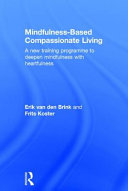

Most ebook files are in PDF format, so you can easily read them using various software such as Foxit Reader or directly on the Google Chrome browser.
Some ebook files are released by publishers in other formats such as .awz, .mobi, .epub, .fb2, etc. You may need to install specific software to read these formats on mobile/PC, such as Calibre.
Please read the tutorial at this link. https://ebooknice.com/page/post?id=faq
We offer FREE conversion to the popular formats you request; however, this may take some time. Therefore, right after payment, please email us, and we will try to provide the service as quickly as possible.
For some exceptional file formats or broken links (if any), please refrain from opening any disputes. Instead, email us first, and we will try to assist within a maximum of 6 hours.
EbookNice Team

Status:
Available0.0
0 reviews
ISBN 10: 1138022144
ISBN 13: 9781138022140
Author: Erik van den Brink, Frits Koster
Mindfulness involves learning to be more aware of life as it unfolds moment by moment, even if these moments bring us difficulty, pain or suffering. This is a challenge we will all face at some time in our lives, and which health professionals face every day in their work. The Mindfulness-Based Compassionate Living programme presents a new way of learning how to face the pressures of modern living by providing an antidote which teaches us how to cultivate kindness and compassion – starting with being kind to ourselves. Compassion involves both sensitivity to our own and others’ suffering and the courage to deal with it. Integrating the work of experts in the field such as Paul Gilbert, Kristin Neff, Christopher Germer and Tara Brach, Erik van den Brink and Frits Koster have established an eight stage step-by-step compassion training programme, supported by practical exercises and free audio downloads, which builds on basic mindfulness skills. Grounded in ancient wisdom and modern science, they demonstrate how being compassionate shapes our minds and brains, and benefits our health and relationships. The programme will be helpful to many, including people with various types of chronic or recurring mental health problems, and can be an effective means of coping better with low self-esteem, self-reproach or shame, enabling participants to experience more warmth, safeness, acceptance and connection with themselves and others. Mindfulness-Based Compassionate Living will be an invaluable manual for mindfulness teachers, therapists and counsellors wishing to bring the ‘care’ back into healthcare, both for their clients and themselves. It can also be used as a self-help guide for personal practice.
Old Truths
The Diagnosis
The Cause
The Prognosis
The Treatment
Modern Myths
The Myth of Controllability
The Myth of Specific Remedies
The Myth of Dependence on Professionals
The Myth of Freedom From Values
Timeless Values
“Put Everything to the Test and Keep What Is Good”
“Treat Others as You Want to Be Treated Yourself”
“There Is More Right Than Wrong With Us”
Causes and Remedies
Causes of Suffering: A Meeting Between East and West
Liberation From Suffering: A Marriage Between East and West
From Mindfulness Training to Compassion Training
Mindfulness Training in Health Care
Compassion Training in Health Care
Session 1: Three Emotion Regulation Systems
Why Do We Need Compassion?
Breathing Space With Kindness (Exercise)
The Evolution of Our Brain
Threat, Drive, and Soothing System
The Three Circles (Exercise)
The Safe Place (Exercise & Instructions)
Kindness Meditation—Yourself (Exercise)
Calendar Exercise: The Soothing System
Session 2: Stress Reactions and Self-Compassion
Fight, Flight, Freeze
Compassionately Dealing With Resistance (Exercise)
Tend and Befriend
Self-Compassion as a Response to Emotional Pain
Self-Compassion Mantra
A Hand on Your Heart (Exercise)
Breathing Space With Compassion—Coping With Emotional Pain (Exercise)
Compassionate Companion (Exercise)
Backdraft and Calendar Exercise
Session 3: Inner Patterns
Compassionately Dealing With Desire (Exercise)
Predominant Mode
Hunger for Self-Esteem, Inner Bully, Shame, Guilt
Recognising Inner Patterns (Exercise)
Kindness Meditation—A Benefactor (Exercise)
Calendar Exercise: The Drive System
Session 4: The Compassion Mode
Circle of Compassion: Attributes and Skills
The Compassion Mode (Exercise)
Doing as If (Exercise)
Kindness Meditation—A Good Friend, Neutral Person, and the Body
Movement Exercises With Kindness
Walking With Kindness (Exercise)
Calendar Exercise: The Inner Bully
Session 5: Self and Others
Compassion Practice: Self-Transcendent and Relational
A Compassionate Letter (Exercise)
Kindness Meditation—A Difficult Person (Exercise)
Compassionate Breathing (Exercise)
Calendar Exercise: The Inner Helper
Session 6: Happiness for All
Common Humanity
Forgiveness (Exercise)
Four Friends for Life
Discovering What Contributes to Happiness
Exercises for Sustainable Happiness: Taking in the Good, Gratitude, Core Values
Kindness Meditation—All Beings (Exercise)
Calendar Exercise: Receiving Compassion
Additional Silent Practice Session
Session 7: Compassion in Daily Life
Equanimity (Exercise)
Motivation Based on Threat, Drive, or Care
What Motivates Me? (Exercise)
Discovering Compassion in Daily Life (Exercise)
Practical Ethics
Compassionate Emergency Plan (Exercise)
Calendar Exercise: Giving Compassion
Session 8: The Healing Power of Compassion
Compassion and Self-Healing
Intimate Connectedness (Exercise: Compassionate Body Scan)
Boundless Openness (Exercise: Stream of Awareness)
Continuing Practice
Compassionate Therapist
Teaching Compassion Practice to Clients
mindfulness-based compassionate living
compassionate mindfulness training
a mindfulness-based stress reduction workbook
a mindfulness-based stress reduction workbook pdf
mindfulness-based compassionate living (mbcl)
Tags: Erik van den Brink, Frits Koster, Compassionate, Mindfulness